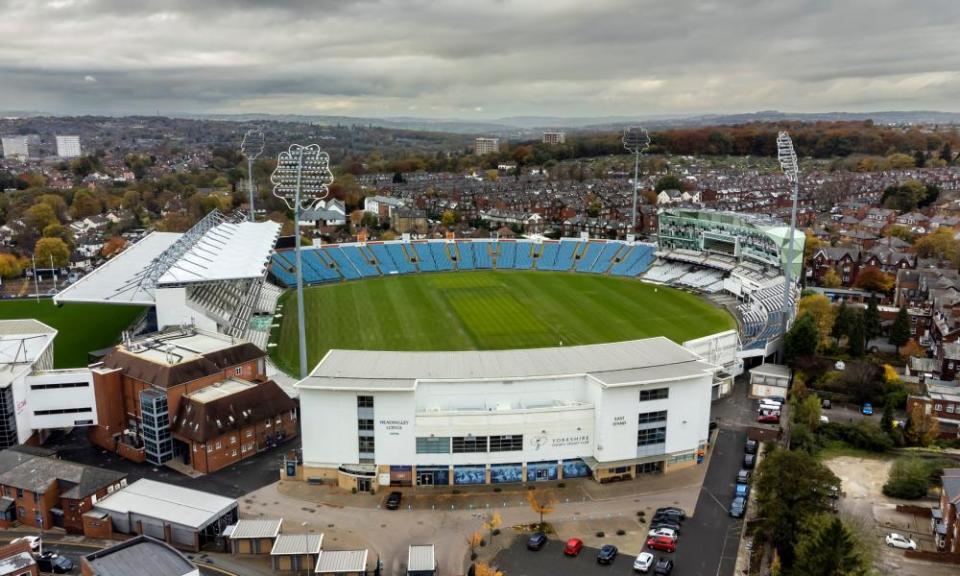
What’s going on?
Last June, after a “thorough and complex investigation”, the England and Wales Cricket Board charged seven individuals, then unnamed, and Yorkshire Cricket Club with bringing the game into disrepute regarding allegations of historic racism. The individuals were later identified as Gary Ballance, John Blain, Tim Bresnan, Andrew Gale, Matthew Hoggard, Richard Pyrah and Michael Vaughan, all former players and coaches at Yorkshire. Their cases were to be heard by the ECB’s Cricket Discipline Commission and now a date has been set: the hearings will run from 1 to 9 March.
Related: Yorkshire admit four charges in ECB racism inquiry as Pyrah pulls out
Why the nine-month wait?
It is an unusually complicated and high-profile case, but hearings were initially scheduled for November only to be pushed back when Azeem Rafiq – the former Yorkshire player whose testimony alleging racism and bullying at the club ignited the saga in 2020 – successfully applied for them to be held in public and extra time had to be allocated to allow for potential appeals against that decision. Previous CDC hearings have been held in private, with only its decisions and any sanctions being published, and there has been no explanation for the change of approach – though Nick de Marco, who represented Rafiq, said he believed the “tide is turning towards the open justice principle in sports regulatory proceedings”, adding: “That principle is about inspiring public confidence in the judicial process, and why should that not apply to a sports tribunal in the same way it applies to the court?”
Does that mean anyone will be able to watch?
Far from it: certain accredited journalists will be allowed to watch a live stream of the hearings, but there will be no access for the general public. The proceedings themselves will operate on a hybrid model, with some participants contributing remotely. The ECB has not yet finalised a location for the hearings, but they will not take place at its own headquarters at Lord’s.
Who will sit on the panel?
A CDC panel always has three members, a chair and two so-called “wingers”, and when one or more current or former cricketers has been charged will contain at least one former player. This panel will be chaired by Tim O’Gorman, once of Derbyshire and currently general counsel and company secretary at Halfords Group, the motoring and cycling retailer. His wingers will be Mark Milliken-Smith KC, who has extensive legal experience in sports discipline, has chaired previous CDC panels and chairs the MCC disciplinary panel, and Dr Seema Patel, a senior lecturer in law at Nottingham Law School with a PhD in sports law and particular expertise in gender discrimination in sport.
Why have Yorkshire already admitted liability?
The decision to hold the hearings in public made a negotiated outcome more appealing – one lawyer who has acted in CDC hearings told the Guardian that it was “a sensible way for them to resolve the matter without being put under the microscope of a public hearing”. It has also helped them to avoid inconvenience and expense, as well as the bad optics of being seen to be in conflict with the ECB – but they will be represented when the CDC panel reconvenes at a later date to decide on punishments.
Why are former players refusing to cooperate?
Blain, Bresnan, Gale, Hoggard and Pyrah have all pulled out amid accusations of bias, with Bresnan last week calling the hearings a “circus” and a “foregone conclusion”. Gary Ballance meanwhile has admitted a charge of using racially discriminatory language so is not required to participate, leaving Michael Vaughan as the only individual who will present a defence – last November the Daily Telegraph reported its columnist was “happy for the proceedings to be held in public and will appear to defend himself”.
Presumably not having a defence makes it harder to be cleared?
Absolutely – without offering a defence the five are likely to be found guilty of all charges, with the CDC operating civil rather than criminal standards of proof – meaning the ECB must prove only that on the balance of probability that those charged are more likely than not to have done something, with the panel now unlikely to hear any conflicting evidence. Also, while under criminal law there should be no negative consequences should a witness refuse to cooperate in a trial, paragraph 7.11 of the CDC regulations state that the panel “may draw such reasonable inferences as it deems proper from any failure by the respondent to attend any disciplinary hearing”.
Will their absence have any other impact?
Well, everything will take less time. Not just because six key witnesses will not speak at all, but because many other witnesses will need to speak much less. For example, while welcoming the decision to hold hearings in public – “We need to have these conversations for transparency and for closure. Let the world see it, what’s there to hide?” – Rafiq said he was not looking forward to being “cross-examined by seven or eight different legal teams”. He will now be cross-examined by only one.
Article courtesy of
Source link